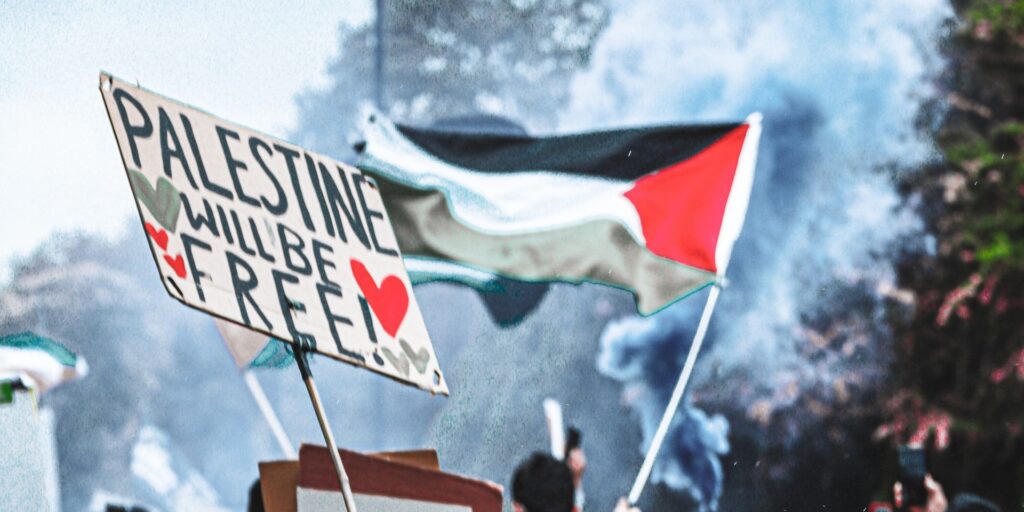I Am Ariel Sharon by Yara El-Ghadban, is a timely novel that sheds light on the ongoing tragedy of the Palestinian people.

OPINION | The views expressed in this article are those of the author.
Part 1 of this article described how Canadian politics, institutions and media have responded to the Israel-Palestine conflict, providing context for my review below of I Am Ariel Sharon.
As I read the novel, I visualized the various women at the bedside of an unconscious Sharon, felled by a stroke and in a coma in a Tel Aviv hospital in 2006. (He remained in a coma for the last eight years of his life.) The first woman is an earth-bound angel who introduces a vital motif, the injustice that hovers over death. In recounting Sharon’s life through the personal recollections of the women who knew him best, we keep coming back to the deaths on the battlefield and those connected to Israel’s occupation of Palestine after the 1967 War.
A Single-minded Goal
After the mysterious woman of the opening chapter, we are introduced to Ariel’s mother, Vera. She addresses the gap between a parent with strong recollections of a different life in Russia with its more sophisticated cultural milieu (but wracked at the end of the 19th century by antisemitism, including pogroms) and the world of Mandate Palestine, in the years leading to the establishment of Israel and the 1948 War with various Arab states. Vera emphasizes that for Sharon, history starts with Israel which explains his single-minded (and many would say short-sighted) focus on creating and then expanding Israel’s borders.
I think back to the many discussions of a two-state solution that I had with my late friend Boris, a Romanian Jew from Israel who emigrated to Canada. We discussed how military-minded leaders like Sharon seriously diminished the prospects for any such solution. Sharon directed the building of the long concrete wall in 2002 that is part of the “matrix of control” and human rights abuses of Palestinians. The wall does not spread out across the Green Line of the 1967 border. Instead, it illegally snakes deep into Occupied Palestinian territory. An advisory ruling by the International Court of Justice in 2004 determined it clearly violates international law and directed it be dismantled. Surely Boris would agree with the assessment of the Jewish American writer Michael Chabon on the need to end Israel’s occupation. Chabon visited in 2016 and called it “the most grievous injustice I have seen in my life.”
In later chapters of the novel, we are also introduced to Sharon’s two wives and the story of the accidental shooting death of his young son, Gour. This and other stories certainly humanize the militant warrior. We are also given brief details of the massacres that Sharon and his troops carried out in Qibya and elsewhere. No event was more horrifying than the massacre at the Sabra and Shatila refugee camps in Lebanon, conducted by Lebanese Phalangists forces as part of the invasion of Lebanon under Sharon’s military command. It was clear that these forces, which killed as many as 1,400 civilian Palestinian refugees, falsely claimed to be “terrorists”, had Sharon’s full knowledge and logistical support. It is surprising there has not been a war crimes inquiry into the event.
Perhaps the most fascinating chapters in the novel are those in the concluding pages with the mysterious woman named Rita. She is clearly a Palestinian nurse but figure of reproach. She offers her stream of consciousness thoughts on the life and legacy of the man known for a time as “the King of Israel” for his military exploits. Rita’s accusations are a nonviolent alternative to vengeance but are meant to suggest that Sharon must have been held to some form of account for the acts of domination and dispossession of the Palestinian people by him or his political orders. The concluding chapters introduce a kind of Arabic magic realism into the work. The politics and the legal (human rights) elements of the novel are subtle but devastating.
A Modern-day Greek Chorus
In a sense, the soliloquies of the women are presumably speaking to Arik (Ariel). However, I see the figures as appearing on a stage and addressing the words to the audience of readers. Another way of thinking about the women’s voices is to hear them as a modern-day Greek chorus. They comment, retroactively, on the vigorous actions of the warrior-king that occur off-stage.
The women reminded me of the characters in Euripides great tragedy, the Trojan Women. These modern-day women, like the actual captives from the Trojan War, are in a sense tied to and captives of Sharon’s vision for a Greater Israel, obtained at the expense of Palestinian self-determination and respect for Palestinian rights. I am putting the matter baldly, and I Am Ariel Sharon works in a more subtle manner! But the commentary on his life the writing affords is nonetheless a lament at the losses caused by relentless military domination.
Looking for more information?
Disclaimer
The information in this article was correct at time of publishing. The law may have changed since then. The views expressed in this article are those of the author and do not necessarily reflect the views of LawNow or the Centre for Public Legal Education Alberta.
Looking for articles like this one to be delivered right to your inbox?

